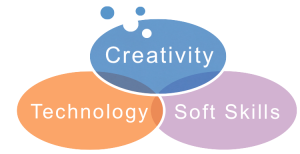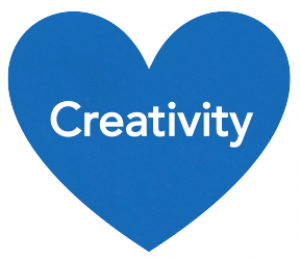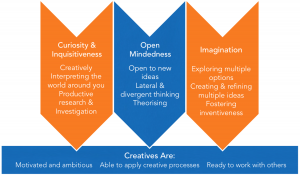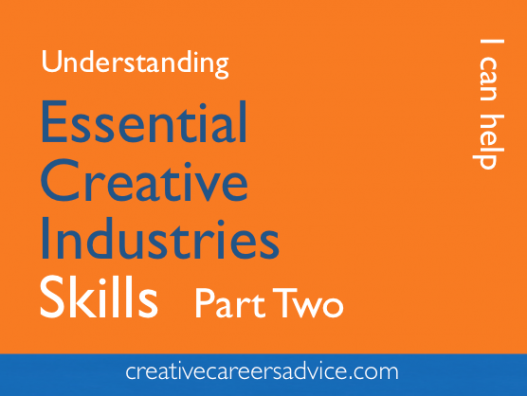In this blog we'll focus more specifically on three core areas and skillsets that can act as a framework for you to use in your promotional campaign material, job applications and interviews.

Creative Skills
Perhaps the most important quality creative employers are looking for are people with ideas, originality, inventiveness and a ‘thinking outside the box’ approach to their work attitude.

The World Economic Forum states:
“That by 2025, the top five skills employers will be looking for include innovation, complex problem solving, critical thinking, creativity and originality. Creativity is one of our most essential skills”

Why not use this as the guide below that helps define some key creative skills employers look for. Start recognising, demonstrating and using these behaviours, where relevant, in your publicity material and networking conversations. It will help break down barriers and invite you in…

“Creativity is extremely important to business. From greater revenue to dealing with change, the benefits of creativity are better understood every day.” https//truscribe.com/
Technical Skills
Whilst we have effectively prioritised creative abilities - digital technology skills are of course an integral part of every creative role, (see below). However, at entry-level employers will not expect you to be a fully-fledged technical expert.
Many may use the phrase “we can teach you these skills”.
This doesn’t mean to say that demonstrating some relevant technical experience isn’t important to have and promote - and some jobs will expect more technical knowledge than others at entry level. But be honest when defining the technical skills you have learned and the stage of expertise you have gained, in CVs promotional devices and interviews.
Some Industry Specific Job Roles & Technical Requirements:
- Graphic Designers: Graphic Designers use image-making software and code.
- Product Designers: Use technical skills to create products that perform a practical function. They need to have an interest in tech and how things work.
- User Experience Designers (UX): Focus on user satisfaction by improving the usability and accessibility for apps or websites, involving coding (HTML, CSS), wire-framing software and prototyping tools: Sketch, Adobe XD, Axure and RP.
- Front End Designers (UI): Also use code and image-making software to design the look & feel of websites, apps.
- Motion Graphic Designers: Use graphic design tools, 2D & 3D animation and live action filming to create short-form sequences, for TV, video and games.
- VFX & 3D Artists: Make environments look real using specialist programmes such as: Blender, Maya, Photoshop, Substance Painter and ZBrush.
- Animators: Use different techniques and tools, including 3D computer graphics, 2D drawn and stop frame to bring ideas to life across multiple media.
Nearly every job combines multiple disciplines and specific tech skills require working in harmony with the creative requirements. And the industry is constantly evolving, adapting and re-positioned to continue to be at the cutting edge of technology and innovation:
“Today's business world is shaped and challenged by the development of highly innovative, competitive and disruptive technologies. New emerging technologies such as cloud computing, the Internet of Things, wearables, 5G, big data analytics and three-dimensional (3D) technologies are urging all relevant stakeholders to rethink and reinvent their approach to quickly and effectively respond to these.” www.tandfonline.com
Soft Skills

These skills are common to all industries but are considered just as important within the Creative Industries. It's also important to understand the difference between what recruiters and employers will refer to as behaviours and competencies in job descriptions.
Behaviours: the way that an employee conducts themselves at work. Commitment, empathy for others, good project management etc.
“I remember the initial few months in my first job out of uni - how most of the time was spent focusing on my social and interactive skills more than anything else. It was a big learning curve for me…” Junior Designer working in UX/UI
Competencies: the skills, knowledge and behaviours that lead to a successful performance.
In most job scenarios that you might consider, whether a permanent or part-time employee within a company team or a freelancer; employers and clients alike will consider these professional behaviours essential:
Communication Teamwork Time Management Passionate
Commercial Awareness Adaptability Working to Deadlines
Pro-activity Problem Solving Negotiation & Persuasion
By developing these skills, you’ll become more employable, able to engage and work successfully with creative colleagues and with your clients, whatever the employment situation might be.

Conclusions
The 'Holistic' Skills Combination Remember - these ‘competencies’ will be an essential part of any job interview you might experience. You need to demonstrate how you’ll go about carrying out specific tasks the job description requires and they’ll be looking to see how you fit into their teams and workplace environment. It isn't enough to rely on your creative and tech skills alone.
Industry Creatives’s are increasingly looking out for that winning combination. So wherever or whenever you’re promoting yourself, make sure you demonstrate these three important skillsets that should be an integral part your pitch strategy…

But remember - look closely at the job requirements, and skills priorities. Then decide if your a good fit and what to prioritise...
Action Point: Why not think of defining your core skills. Highlight ways you demonstrate one key skill for each of the three-point skills: Creative, Technical and Soft…
All photographs in this blog are courtesy of: Unsplash - https://unsplash.com/
© Paul Butler is Creative Careers Adviser, Design Director and HE Lecturer in employability and Creative Industry careers.
For one-to-one creative careers advice and coaching contact me at: paulb@creativecareersadvice.com
If you found this blog useful share it with your contacts and follow me for more posts on creative careers advice and employability topics.
Related articles: 'Confidence In Public Speaking' and 'Pitch & Presentation'
Why not sign up for membership of Tern Heads: https://ternheads.com/ A creative community of peers and professionals, dedicated to entry-level talent. We offer a network of accessible opportunities and a space to showcase your work to potential employers.
